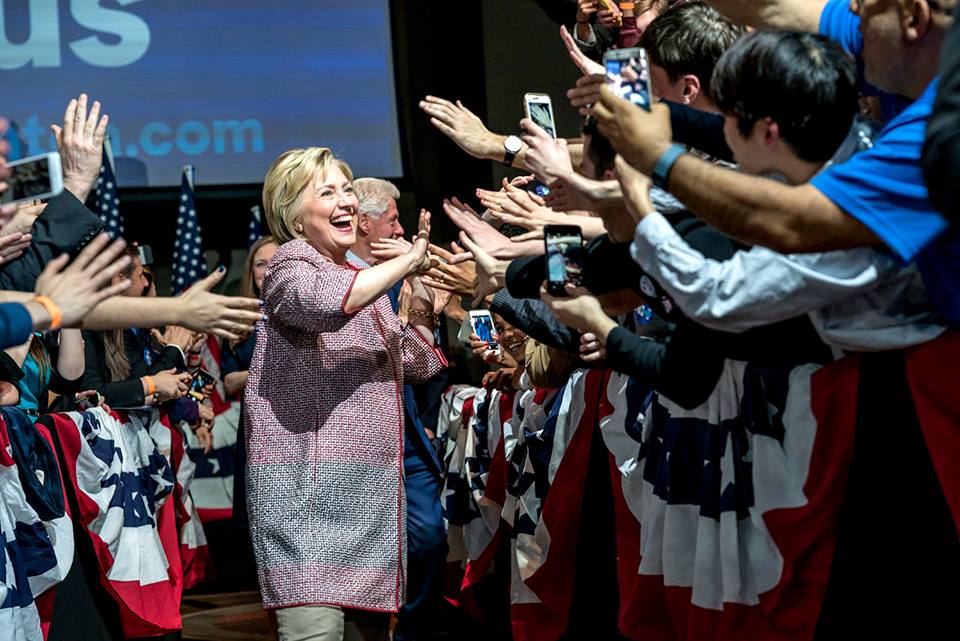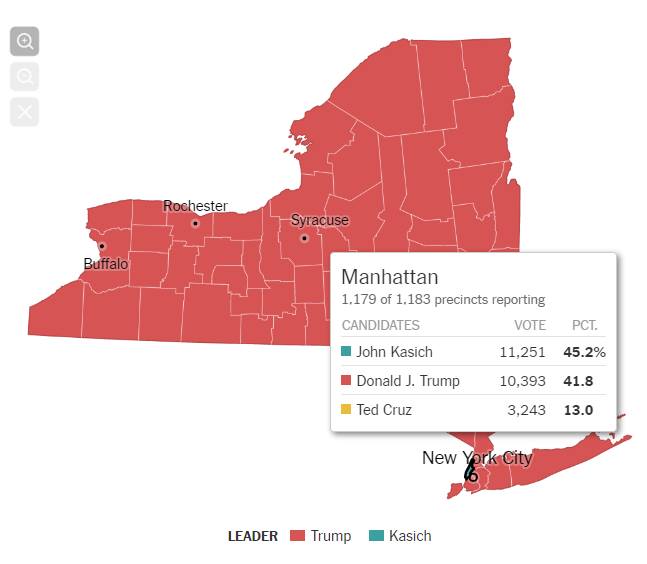
The New York primaries are over, and it’s clear that they will be yuuuuuge victories for Republican frontrunner and businessman Donald Trump and former US secretary of state Hillary Clinton.![]()
![]()
Of course, New York is central to both politicians’ careers. Trump built his real estate empire in New York City, and he launched his campaign from his now-iconic Trump Tower last summer. Clinton transitioned from activist first lady to public official when she won a seat in the US senate from New York in November 2000, a position she held through her presidential campaign in 2008.
Neither Clinton nor (especially) Trump will become their party’s presumptive nominee, but their victories most certainly give their opponents little comfort. Primaries next week in Maryland, Connecticut, Rhode Island and Pennsylvania do not seem likely to change the narrative.
One silver lining comes for Ohio governor John Kasich, who continues to wage a longshot campaign. He easily won second place last night, though Trump defeated him by a 60% to 25% margin. It will be good for at least some delegates, though, as Kasich took all of New York County, which corresponds to Manhattan.
When will Texas senator Ted Cruz drop out, considering that he’s now playing such a spoiler role to Kasich? (I jest…)
California dreaming
Leaping ahead for a moment, though, it seems now obvious that the real fight for the Republican nomination will take place in California, which will go a long way in setting the stage for a convention where Trump, despite his stunning New York victory, is unlikely to win the 1,237 delegates he needs to clear a first-ballot victory.
California will, therefore, play an outsized role as the final major primary on June 7, just as Iowa and New Hampshire play outsized roles as first-in-the-nation contests.
Forget the delegate count for a moment.
If Trump loses (or only narrowly wins) on June 7, he’s going to have a very hard time securing the nomination on the first ballot without 1,237 delegates. A second ballot, with RNC stalwarts serving as delegates, could easily see the nomination delivered to Cruz, to Kasich, or to another figures whose general election chances seem much brighter.
But if Trump enjoys a 20% blowout win, he’ll have a far easier time.
So what does Dan Lungren think about Trump?
Congressmen Darrell Issa and Tom McClintock?
Meg Whitman? Carly Fiorina (for what it’s worth, a Cruz supporter)?
Former governor Pete Wilson?
Former governor Arnold Schwarzenegger, for what it’s worth, already supports Kasich.
If I were Cruz, I’d be putting all my chips on Inland Empire, the libertarian north and Orange County. And now, not on May 19.
If I were Kasich, I’d be pushing hard in Silicon Valley and in urban areas like San Francisco, Los Angeles and even, possibly, the veteran-heavy San Diego.
A Clinton win, but…
I’m not always a Hillary Clinton enthusiast. But when I see the supporters of US senator Bernie Sanders talking about contested conventions, I just have to wonder what planet they’re on. He lags in pledged delegates, in raw vote totals and in superdelegates, and he just lost a primary by 18% in one of the country’s most important (and diverse!) states.
Ironically, if the Sanders campaign hadn’t foolishly been talking about an upset for the past month, the story from New York’s primary just might have been, ‘Clinton wins just 58% in state she represented in Senate.’ Instead, it’s a landslide loss for Sanders, even in that ultra-hipster of youth enclaves, Brooklyn.
Again, stepping back from the day-to-day politics, what’s interesting is that I don’t know what Clinton even stands for. I couldn’t tell you three original policy ideas that animate her campaign. Trump’s policies are, quite literally, trade wars with China, a wall on the Mexican border, halting Muslim immigration to the United States and, somehow, ‘winning again.’ You might have expected Clinton to leverage the historic nature of being the first female US president by championing, say, paid parental leave. But that hasn’t happened. She’s hugged outgoing president Barack Obama, and her campaign policy pitch seems to be ‘Obama’s third term on domestic policy, with a slightly more hawkish foreign policy.’ (Except on free trade, where Clinton has abandoned her previous support for the Trans-Pacific Partnership (TPP) and the equally important Transatlantic Trade and Investment Partnership (TTIP).
Sanders might ultimately become the real policy winner in the long run, because smart people are now thinking about the economics of a $15 minimum wage in earnest, about reforms to student debt and free education, about the role of money in campaigns (though I think that is overstated), about a fairer foreign policy perspective on Palestine (not the smartest fight to pick in a state with the largest Jewish community in the United States). That seems especially true when you look at the kind of margins Sanders is racking up among 18-to-29-year-olds. Clearly, the future American electorate isn’t just less white — it will embrace a much sharper leftism, too.
Moreover, while I hear so many folks talking in sort of pollyanna terms about how great it is to be part of a Democratic Party with two great options in Clinton and Sanders, that rings false to me.
The truth seems more like the Democrats, in 2015, were somewhat of a party of cowards who choked in the face of a too-powerful Clinton machine that seemed invincible and turned out to be anything but invincible.
Put aside Clinton’s experience and competence. Put aside the spirit and enthusiasm that Sanders has generated.
It would have been great to have a stage of a half-dozen or more officials on the American center-left, with real experience in government, debating one another. Former Massachusetts governor Deval Patrick. California governor Jerry Brown. Former Washington governors Christine Gregoire and Gary Locke. Massachusetts senator and consumer advocate Elizabeth Warren. US vice president Joe Biden. New York senator Kirsten Gillibrand. Virginia senators Mark Warner or Tim Kaine. Among others.
It all seems like a lost opportunity.
